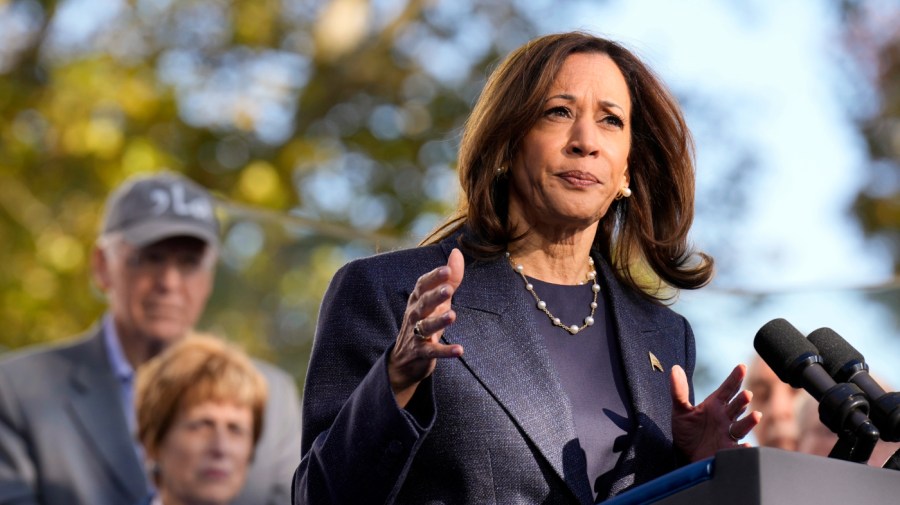Kamala Harris is continuing to underperform across the polling spectrum.
Pick any average from the multitude of polling views — two-way, multicandidate, battleground states, and even individual battleground states — and Harris is running consistently below where Joe Biden was in 2020 and Hillary Clinton in 2016.
So it’s no surprise Democrats are growing nervous.
There’s a reason the Harris campaign is suddenly making her available for softball media opportunities, such as her recent appearances on CBS’s “60 Minutes” and “The Late Show with Stephen Colbert” as well as ABC’s “The View,” and even for riskier ones like her Wednesday appearance on Fox News.
Gone is the strategy attributed to Abraham Lincoln that it is “better to remain silent and be thought a fool than to speak and remove all doubt.” Silence is a luxury that Team Kamala can no longer afford. A look at Harris’ polling numbers will tell you why.
The RealClearPolitics Oct. 17 average of national two-way race polling shows Harris leading Trump, 49.2 percent to 47.7 percent. That’s close, but it’s still a lead —no reason to panic, right?
Wrong. Remember that Biden beat Trump by 4.4 percent in 2020’s popular vote, yet he barely squeaked by in the Electoral College. His margin of victory there came from winning Arizona, Georgia, Nevada, and Wisconsin (with 43 electoral votes) by less than 77,000 votes combined.
The reason for Biden’s comparatively wide popular vote margin and his narrow electoral victory came from racking up surplus votes in California and New York, worth roughly 4.4 percent of the total popular vote.
In 2016, Hillary Clinton rolled up similar California and New York surpluses but just a 2.1 percentage-point popular vote margin overall (48.2 to 46.1 percent). She lost the electoral vote handily (304-227).
That Harris’s current polling lead is slightly below Hillary’s 2016 popular vote margin is reason enough for Democrats to worry. But they have bigger worries still, because Harris is polling far worse now than either Biden or Clinton at the same time in 2020 and 2016. What’s more, she’s doing it almost across the board.
Although the RealClearPolitics’ Oct. 17 national average of two-way polling shows Harris with a 1.5 percentage-point national lead now, in 2020 Biden had a 9-point lead; in 2016 Clinton had a 7-point lead.
The battleground states, however, are where the real story lies. RealClearPolitics’s Oct. 13 top battleground polling average has Trump leading Harris very narrowly, 48.3 percent to 47.9 percent. At this point in 2020, Biden led in this average by 5 points.
Also, according to RealClearPolitics polling averages as of Oct. 17, Trump leads (albeit narrowly) in all seven battleground states, having taken a negligible one-tenth of a point lead in Wisconsin in recent days. In contrast, Biden led in all seven of these states at this point in 2020 — in some cases by several points. And not only is Harris underperforming Biden, she is also underperforming Clinton’s losing 2016 effort in six of the seven (all except Georgia).
The danger is obvious: Despite COVID, civil unrest, and pandemic lockdowns, Biden only just barely won in 2020. Despite better (in some states much better) polling than Harris has now, Clinton unexpectedly lost to Trump in 2016.
Democrats have only two hopes. One is that today’s polls are more accurately gauging the electorate, and that Harris is therefore at least close to where she needs to be. The other is that by suddenly coming out of hiding to take friendly interviews, she can convince an electorate that seems unconvinced.
Neither should be a source of comfort for Democrats.
But hope is not a strategy. That’s why Harris’s campaign managers are changing theirs. They know she is losing now, and absent significant improvement, she will lose in November.
Today’s polling speaks volumes; the Harris campaign’s increasing desperation speaks louder still.
J.T. Young is the author of the upcoming book, “Unprecedented Assault: How Big Government Unleashed America’s Socialist Left” and has over three decades of experience working in Congress, the Department of Treasury, and the White House Office of Management and budget, and representing a Fortune 20 company.

